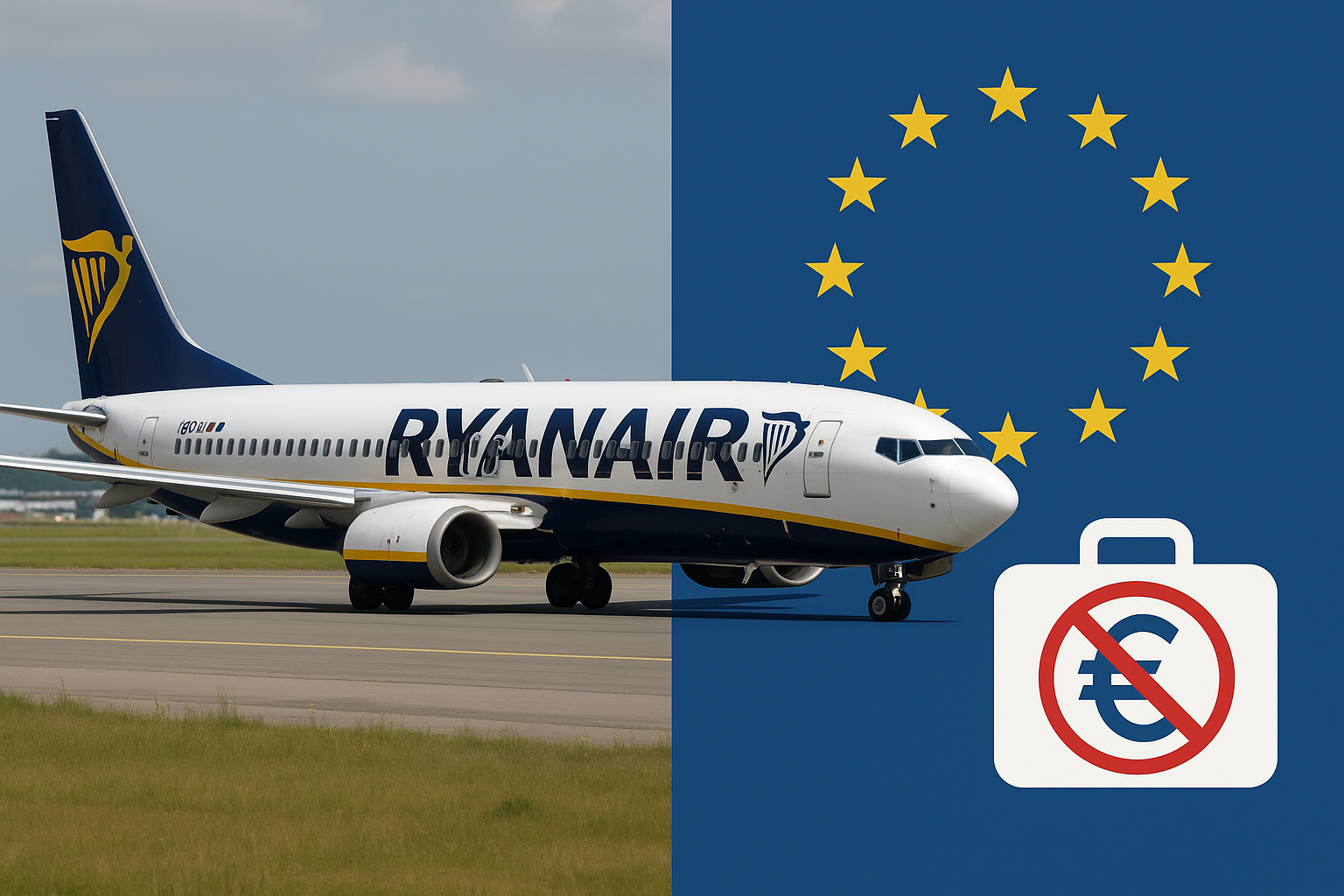Ryanair, Europe’s largest low-cost airline, is facing a significant regulatory challenge that could disrupt its business model after a landmark court ruling has sparked a broader European Union initiative to introduce free hand luggage regulations. This potential shift in aviation policy is not only a blow to Ryanair but could also upend the revenue strategies of other budget carriers that rely heavily on ancillary charges, especially baggage fees.
The proposed EU regulations—voted through by the European Parliament’s Transport and Tourism Committee on June 24, 2025—aim to standardize hand luggage dimensions and eliminate extra fees for carry-on items, ensuring a fairer and more transparent travel experience across the continent.
Legal Pressure Mounts on Airline Baggage Fees
The EU’s move follows mounting legal and consumer pressure. A pivotal moment came in September 2024, when a Portuguese court ruled that airlines cannot charge passengers for bringing hand luggage onboard. The case was brought against Ryanair by a passenger who was charged €56.50 for a standard cabin bag. The court sided with the passenger, citing the bag’s size and weight as acceptable for air travel without extra fees.
This legal victory has served as a catalyst for the EU’s current push, highlighting increasing dissatisfaction among travelers who have long endured what many view as unjustifiable surcharges.
Proposed Regulation: Uniform Rules for All Airlines
The European Parliament is now advancing legislation that would require all airlines operating within the EU to follow a uniform standard for hand luggage dimensions. This would end the existing confusion caused by inconsistent baggage policies across airlines. If passed, airlines would no longer be able to impose arbitrary charges on passengers for carry-on bags that meet standardized criteria.
Additionally, the proposed rules would force airlines to clearly disclose any baggage-related fees at the time of booking. This focus on transparency is designed to empower consumers and protect them from hidden or last-minute charges.
Ryanair’s Business Model Under Threat
Low-cost carriers like Ryanair have long structured their business models around low base fares paired with ancillary revenue streams, particularly charges for baggage, seat selection, and priority boarding. According to Ryanair’s financial reports, non-ticket revenue—largely driven by these fees—accounts for over 40% of its total income.
Should the EU legislation pass, airlines like Ryanair may be compelled to reassess their pricing strategies, potentially raising base fares to compensate for the lost revenue. This could fundamentally alter the competitive landscape of low-cost travel in Europe.
Spain’s Crackdown: €179 Million in Airline Fines
The EU push also follows actions by national governments. In December 2024, Spain’s Ministry of Consumer Affairs fined five low-cost airlines—including Ryanair—a collective €179 million for charging passengers for larger cabin bags, which regulators deemed essential travel items. The fine marked one of the largest regulatory interventions in recent aviation history and sent a strong message to airlines operating under questionable fee structures.
Consumer rights groups across Europe have applauded these actions, arguing that such fees disproportionately affect budget-conscious travelers and families who often rely on carry-on luggage to avoid expensive checked bag costs.
Flight Delay Compensation Rules Also Under Review
In addition to baggage policies, the European Union is concurrently reviewing compensation rules for delayed flights. Under new proposals backed by member states, passengers will only be entitled to compensation for short-haul delays if the flight is delayed by four or more hours—up from the current three. For long-haul flights, the delay threshold increases to six hours.
While the changes aim to strike a balance between airline operation challenges and passenger rights, critics argue that the higher thresholds could reduce passenger protections. Still, these regulatory shifts underscore the EU’s broader commitment to overhauling passenger rights laws for greater clarity and fairness.
A Major Turning Point for European Aviation
These proposals come at a time when the airline industry is recovering from the turbulence of the COVID-19 pandemic and subsequent operational bottlenecks. With travel demand surging across Europe, consumer scrutiny of airline pricing and service standards has intensified. The renewed focus on fair pricing and consistent policies signals a major turning point for the aviation sector.
For travelers, these changes could mean more predictable and affordable air travel, particularly for those flying within Europe. Standardized hand luggage policies would not only reduce the stress of navigating differing airline rules but also eliminate the surprise charges that often await at the boarding gate.
Conclusion: Ryanair and Other Carriers at a Regulatory Crossroads
The EU’s proposed free hand luggage rules, spurred by judicial and governmental intervention, represent a landmark moment for aviation reform in Europe. While airlines like Ryanair have benefited from the à la carte pricing model, growing legal and political momentum may force a strategic shift.
As the legislation proceeds through the EU’s policymaking process, industry stakeholders will closely monitor how airlines respond. Will carriers absorb the cost and maintain low base fares? Or will the loss of ancillary income result in fare hikes, ultimately shifting the economics of low-cost travel?
Either way, the move marks a critical evolution in passenger rights and airline accountability—one that could make air travel across Europe more consistent, transparent, and traveler-friendly.
For more travel news like this, keep reading Global Travel Wire
















